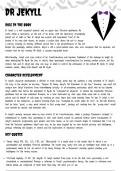DR JEKYLL
Role in the BOOK
Dr Jekyll is a well respected scientist and an upper class Victorian gentleman. He
works within a laboratory at the rear of his house, with the laboratory strategically
placed out of sight so that Dr Jekyll can explore and experiment. Tired of the
burden of his own dark desires, he creates a potion that allows the evil to escape
a person, creating an entirely different person who is the personification of this evil.
Despite this seemingly reckless venture, Jekyll is still a good-natured man, who soon recognises that his separate, evil
creature that he has created, Mr Hyde, is causing irreparable harm.
Unfortunately, Jekyll soon loses control of his transformations and becomes frightened of the damage he might do
when embodying Mr Hyde. He tries to rectify these impromptu transformations by making another potion, but this
venture fails and Dr Jekyll sees only one way in which to control the dominance of the wicked Mr Hyde. Dr Jekyll
commits suicide, killing both himself and Mr Hyde.
Character Development
Dr Jekyll's character development is difficult to track closely, given that the audience is only informed of Dr Jekyll's
full story in the chapter he narrates, "Chapter 10: Henry Jekyll's Full Statement of the Case." However, one could still
analyse how Jekyll transitions from overwhelming curiosity to all-consuming anxiousness about who he has become.
Jekyll admits that before the emergence of Hyde, he "concealed his pleasures" to remain the respectable Victorian
gentleman that he once embodied. However, he is later motivated by dark urges which cause him to create the
potion and rid himself of such urges by creating an outer figure that could embody them for him. Dr Jekyll is not
blameless in this endeavour, as despite knowing Hyde was "trampling his victim under his foot", he still tells Utterson
that he takes "great, a very great interest in that young man", perhaps not realising how this "young man" would
soon become his master and dominate him.
Dr Jekyll's anxiety increases when he loses control of his transformations, which is perhaps Stevenson's attempt to
communicate to readers that succumbing to one's dark desires cannot be achieved without severe consequences. Dr
Jekyll's character progressively gets weaker and more manic, as his own creation begins to command him. A far cry
from the Victorian gentleman Jekyll once was, he has been crippled by his own morbid curiosity and intelligence,
perhaps reflecting the dangers of science and the exploration of unnatural ventures.
Key quotes
"Henry Jekyll, M.D., D.C.L., LL.D., F.RS., etc." (Narration)- It is made clear to the reader that Dr Jekyll is an
accomplished and intelligent Victorian gentleman. The reader may query how such an intelligent man ended up in a
predicament where he lost all control of his being. Perhaps this is Stevenson's warning against wielding your
intelligence for the wrong reasons.
"Profound duplicity of life" (Dr Jekyll)- Dr Jekyll realised from early in his life that one's personality is not
streamlined or uncomplicated. Perhaps a reference to Freud's psychoanalytic theory, this seems to reference how
human beings are composed of much more than they will allow you to see.
, DR JEKYLL
Key quotes
“He came out of his seclusion, renewed relations with his friends, became one more their
familiar guest and entertainer” (Narration)- It is through Mr Hyde's murderous actions that
Dr Jekyll finds relief. Dr Jekyll therefore is not a blameless character, as the relief he finds
in violence is grotesque.
"had fallen upon his knees and lifted his clasped hands to God" (Narration)- Though Dr
Jekyll was somewhat well-versed in religious studies ("he was now no less distinguished for
religion"), it was only the burden of Mr Hyde that had led him back to seeking God for a
solution. Dr Jekyll knows science and his intelligence could only get him so far, so calls on a
higher power to rectify his scientific mistakes.
Contextual link
The reader will likely not be surprised by the disaster that ensued as a result of Dr Jekyll's scientific experiments.
Victorian society was largely still one that embraced Christian ideas and beliefs about how life is created, as well as
how to conduct one's life. Therefore, to read about Dr Jekyll meddling in God's creation was a frightening experience
for the contemporary reader. Victorians had general suspicions about the ever-growing scientific revolution, believing
that science should not interfere with human nature, the things that God usually controls. The fact that Dr Jekyll does
meddle in this area by creating potions to transform into Mr Hyde is a confirmation of the corrupting side effects
of scientific advancement for Victorians.
This novella is particularly shocking for contemporary readers, as Dr Jekyll possessed much of the characteristics of a
Victorian gentleman. Etiquette in Victorian England was important, as that is how people viewed you and gained an
understanding of you as a person. Conformity was encouraged and there was an expectation that Victorians followed
published guidance on proper behaviour. Dr Jekyll is forced to act like a polished Victorian gentleman, through his smart
clothing, respectable profession and sensible conduct. Perhaps this is why he seeks an escape through Mr Hyde in the
first place, as the expectation to maintain this persona was overwhelming.





